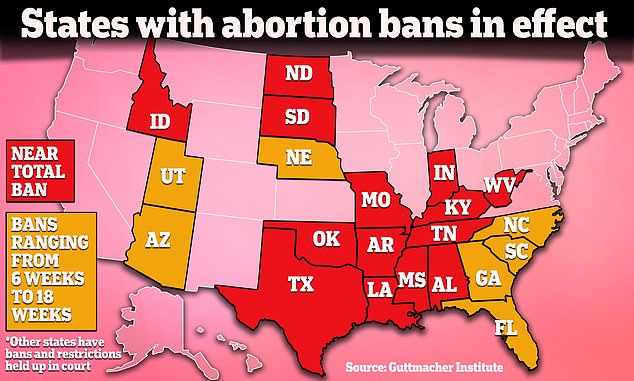Florida clears way for 6-week abortion ban: Supreme Court upholds 15-week ban in bombastic ruling… but will let voters weigh in on access in 2024 election
- The ruling paves the way for a six-week ban that will come into effect in the next 30 days
- If the ballot initiative is successful, it could protect abortion access until about 24 weeks
- READ MORE: Abortions Reach Highest Level Since 2014 DESPITE Roe Overturn
The Florida Supreme Court today upheld a 15-week abortion ban in a long-awaited ruling.
The move paves the way for Governor Ron DeSantis’ stricter six-week ban to take effect next month.
But in a separate decision released at the same time, the court approved a measure that will allow Floridians to vote this fall on whether to expand access to abortion.
If it passes, it could overturn the bans and enshrine abortion rights in the state constitution.
The state Supreme Court’s dueling rulings on Monday included one that allowed for the implementation of a six-week abortion ban. The other, the passage of a ballot initiative to enshrine abortion rights in the Constitution, marked a major victory for abortion rights groups.

Florida’s six-week ban goes into effect May 1 and is one of the most restrictive in the country
The ballot measure that cleared the conservative court marked a victory for abortion rights groups, which had begun collecting signatures about a year ago, shortly after Republican Gov. Ron DeSantis signed a six-week ban.
The outcome of the ballot initiative will have huge implications for reproductive health care in the South, where strict bans have forced clinics to close their doors permanently.
Once Florida’s six-week ban goes into effect on May 1, Virginia — which allows abortion until just after 26 weeks — will be the only Southern state to allow abortion after the first trimester.
The state’s 15-week ban, which was signed into law by Governor DeSantis in 2022, had already been implemented and was being deliberated by the court. The six-week ban was written in 2023 so it wouldn’t go into effect until a month after the 2022 law goes into effect.
Florida’s ban includes exceptions for rape, incest and saving the life of the mother. It will also virtually eliminate access to abortion in the South.
The state was seen by abortion rights advocates as an island in a sea of restrictions.
In the year after the Supreme Court struck down the federal right to abortion in June 2022, Florida recorded 20,460 more clinic-provided abortions than the year before. The spike was largely due to people traveling there from nearby red states.
The Florida Supreme Court faced an April 1 deadline to rule on the ballot measure, known as Amendment 4: “No law shall prohibit, penalize, delay, or restrict abortion before viability or when necessary to protect the patient’s health, as determined by the patient’s healthcare provider.”
The point of fetal viability is typically around 22 to 25 weeks of gestation.
The ballot measure needs the support of 60 percent of Florida voters to pass, the highest threshold in the US.
Florida is the 11th state to put abortion rights on the 2024 ballot, after abortion rights groups achieved success with ballot measures in California, Michigan, Ohio and Vermont.
The court has been reshaped by culture warrior and former presidential candidate Ron DeSantis, who appointed five of the court’s seven justices.
In ruling on the bans, the justices said the ballot language was clear and “unambiguous,” though opponents of the measure said it was too complicated for voters to understand.
Chief Justice Carlos Muñiz, a DeSantis appointee, had said during arguments in February: “Floridians are not stupid. They can figure it out.’
The state GOP, meanwhile, has called the ballot measure ‘deceptively worded pro-abortion’.
Floridians Protecting Freedom, the coalition leading the charge against the ballot measure, launched a signature-gathering campaign last year to put the question before voters, and in September reached the necessary threshold to get the Supreme Court to intervene .
The state validated more than 910,000 signatures in January, slightly more than the 891,000 needed to move to a vote.
